BJP Faces Setbacks in Haryana and Jammu-Kashmir Elections
India's ruling BJP trails in two provincial elections, potentially boosting opposition Congress. Results may impact BJP's standing ahead of crucial state polls in Maharashtra and Jharkhand.

In a significant political development, Narendra Modi's Bharatiya Janata Party (BJP) appears to be trailing in two provincial elections in India. The vote counting, which began on October 8, 2024, has revealed unexpected challenges for the ruling party in the northern state of Haryana and the region of Jammu and Kashmir.
These elections, held in phases concluding on October 5, 2024, mark the first test of public sentiment since Modi secured his third consecutive term as Prime Minister in June 2024. The results are being closely watched as they could indicate shifting political dynamics in the world's largest democracy.
In Haryana, a state known for its agricultural and industrial output, early counts show the Indian National Congress leading in 57 seats, while the BJP is ahead in only 22 seats. This outcome, if confirmed, would end a decade of BJP rule in the state. Similarly, in Jammu and Kashmir, where elections were held for the first time since its reorganization in 2019, the Congress-National Conference alliance appears to be outperforming the BJP, leading in 44 seats compared to the BJP's 29.

These results, while not directly impacting the federal government's ability to implement national policies, could be seen as a setback for the BJP. The party's performance in these elections may influence its prospects in the upcoming polls in Maharashtra and Jharkhand, expected to be held in November 2024.
"These results, if confirmed, could signal a shift in voter sentiment and potentially reinvigorate the opposition. However, it's important to note that state elections don't always reflect national trends."
The apparent success of the Congress party in these elections could provide a significant boost to its leader, Rahul Gandhi. As the face of a 24-party opposition alliance that denied Modi an outright majority in the recent general election, Gandhi has been working to revitalize his party's standing since the BJP's rise to power in 2014.
India's political landscape is characterized by its multi-party system and the significant role of regional parties. The country's federal structure allows for diverse political scenarios across different states, making each election a crucial indicator of public sentiment.
The Election Commission of India, responsible for overseeing the electoral process, ensures the integrity of these democratic exercises. As the world's largest democracy, India's elections are always of global interest, with the outcomes often influencing regional and international dynamics.
As the final results are awaited, political analysts are keenly observing how these outcomes might reshape alliances and strategies for future elections, particularly in the economically significant states of Maharashtra and mineral-rich Jharkhand.


































